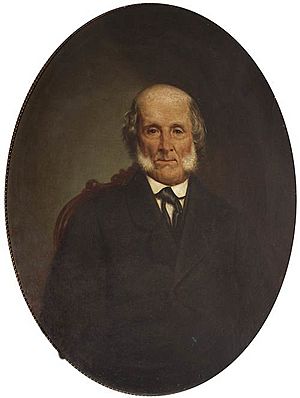Juan Bautista Vitón facts for kids
Quick facts for kids
Juan Bautista Vitón
|
|
|---|---|

portrait of Juan Bautista Vitón by Prilidiano Pueyrredón
|
|
| Personal details | |
| Born |
Juan Bautista Vitón y Santibáñez
1780 Cádiz, Spain |
| Died | 1868 Tigre, Argentina |
| Occupation | politician merchant military man |
| Signature |  |
| Military service | |
| Allegiance | |
| Branch/service | Milicias de Buenos Aires |
| Years of service | 1806-1807 |
| Rank | Lieutenant |
| Unit | Cuerpo de Voluntarios Artilleros de la Unión |
| Battles/wars | British invasions of the River Plate |
Juan Bautista Vitón (1780 – 1868) was a Spanish man who became a politician, a businessman, and a soldier. He served as a lieutenant (a military officer) in a special army unit called the Cuerpo de Voluntarios Artilleros de la Unión in Buenos Aires. This unit was formed during the British invasions of the River Plate, when British forces tried to invade the area around the River Plate in South America.
Contents
Who Was Juan Bautista Vitón?
Juan Bautista Vitón was born in 1780 in Cádiz, a city in Spain. His parents were Ramón Vitón and María Isabel Santibañez. He came from a well-known family.
Early Life and Family
Around the year 1800, when he was about 20 years old, Juan Bautista Vitón moved to Buenos Aires, which is now the capital of Argentina. There, he married Margarita López de Barrios y Chiclana. Her uncle was Feliciano Antonio de Chiclana, a very important lawyer. Feliciano played a key role in the May Revolution, a big event where people in Buenos Aires began to fight for independence from Spain.
A Soldier in Buenos Aires
Juan Bautista Vitón was a soldier and took part in the British invasions of the River Plate. He served as a lieutenant in the artillery, which means he was in charge of cannons and other big guns. He fought in the main battles against the British troops.
After the May Revolution
The May Revolution was a time when people in Buenos Aires wanted to be free from Spanish rule. Juan Bautista Vitón did not support this movement. Because of his opposition, he was sent away to live in La Rioja Province, a distant part of Argentina. He lived there for some time before returning. He passed away in 1868 in Tigre, Argentina.
 | James Van Der Zee |
 | Alma Thomas |
 | Ellis Wilson |
 | Margaret Taylor-Burroughs |

